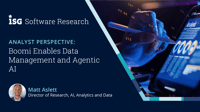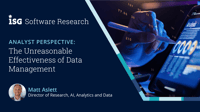One of the key questions that will need to be solved if agentic artificial intelligence is to fulfill its potential is which technologies and providers will serve the role of orchestrating communication and integration between the various models, applications and data repositories involved. ISG Research defines agentic AI as software designed to execute business processes through autonomous actions, potentially controlling multiple processes and systems through the orchestration of one or more...
Read More
Topics:
Governance,
Operations,
AI,
Generative AI,
Data Intelligence,
AI & Technologies,
AI and Machine Learning
If a single phrase could sum up the big data craze of a dozen or so years ago, it would be “more data beats better algorithms.” Attributed to Google research director Peter Norvig, the quote effectively summarized a research paper Norvig jointly authored called The Unreasonable Effectiveness of Data and was embraced by big data enthusiasts as articulating the prevalent thinking that enterprises with the largest volumes of data have an advantage over rivals. The phrase was, of course, an...
Read More
Topics:
Operations,
AI,
Data Intelligence,
AI & Technologies,
AI and Machine Learning
I have previously described how data as a product was initially closely aligned with data mesh, a cultural and organizational approach to distributed data processing. As a result of data mesh’s association with distributed data, many assumed that the concept was diametrically opposed to the data lake, which offered a platform for combining large volumes of data from multiple data sources. That assumption was always misguided: There was never any reason why data lakes could not be used as a data...
Read More
Topics:
Operations,
Data Platforms,
Data Intelligence,
AI & Technologies
I recently described how business data catalogs are evolving into data intelligence catalogs. These catalogs combine technical and business metadata and data governance capabilities with knowledge graph functionality to deliver a holistic, business-level view of data production and consumption. The concept of the knowledge graph has been part of the data sector for decades, but adoption has typically been limited to industries and enterprises focused on the Semantic Web, such as media,...
Read More
Topics:
Governance,
Data Governance,
Generative AI,
Data Intelligence,
AI & Technologies
Data governance has always been a critical part of the data and analytics landscape. However, for many years, it was seen as a preventive function to limit access to data and ensure compliance with security and data privacy requirements. To fulfill today’s data-driven agendas, many enterprises need an evolved perspective on data governance. The development of new applications driven by artificial intelligence requires a more agile and collaborative approach to data governance—one that automates...
Read More
Topics:
Governance,
Machine Learning,
Operations,
AI,
Data Intelligence
It has been a little over a decade since the term data operations entered the analytics and data lexicon. It describes the application of agile development, DevOps and lean manufacturing by data engineering professionals in support of data production. DataOps was initially seen as antithetical to traditional data management approaches, which typically included batch-based and manual tools and practices. The term was embraced by emerging software providers as a means of differentiating from...
Read More
Topics:
Governance,
Machine Learning,
Operations,
Generative AI,
Data Intelligence
In an earlier Analyst Perspective, I discussed data democratization’s role in creating a data-driven enterprise agenda. Building a foundation of self-service data discovery, data-driven organizations provide more workers with the ability to analyze and use data. I’ve also examined how generative artificial intelligence (GenAI) could revolutionize business intelligence software by using natural language interfaces to lower the barriers to working with analytics software. Today, however, data...
Read More
Topics:
Analytics,
AI,
Data Intelligence
Data catalogs provide an inventory of data assets that surface metadata from data platforms, analytics tools and applications that can be used to facilitate data discovery and data usage across an enterprise. As I recently explained, however, there are actually multiple types of data catalogs that offer functionality to address specific use cases and user roles, including data inventory, data discovery and data governance. The data intelligence catalog is an emerging category that combines...
Read More
Topics:
Governance,
Operations,
AI,
Data Platforms,
Data Intelligence,
AI & Technologies
As enterprises seek to expand and accelerate the adoption of artificial intelligence (AI) many are finding that longstanding analytics and data challenges are a barrier to success. As was explained in ISG’s State of Generative AI Market Report, AI requires data that is clean, well-organized and compliant with regulatory standards. The need for good data management is by no means new, but the expectations and demands associated with AI are a forcing function for enterprises to take long-overdue...
Read More
Topics:
Machine Learning,
Analytics,
Data,
Artificial intelligence,
natural language processing,
Generative AI,
Data Intelligence,
Machine Learning Operations
Late 2024 saw the publication of the 2024 ISG Buyers Guides for DataOps, providing an assessment of 49 software providers offering products used by data engineers, data scientists, and data and AI professionals to facilitate the use of data for analytics and AI needs. The DataOps Buyers Guide research includes five reports which are focused on overall DataOps, Data Observability, Data Orchestration, Data Pipelines and Data Products. This is the first time in the industry when all software...
Read More
Topics:
Analytics,
Data Platforms,
Data Intelligence,
Analytics and Data,
AI and Machine Learning




















